January 1, 2012 (View All Issues)
BOLERO-2: Everolimus Thwarts Resistance to Hormonal Therapy in Advanced Breast Cancer
Adding an inhibitor of the mammalian target of rapamycin (mTOR) to hormonal therapy for advanced breast cancer effectively circumvents resistance, suggest updated results of the randomized BOLERO-2 trial.
With a median follow-up of 12.5 months, the likelihood of disease progression or death among...
Ruxolitinib for Myelofibrosis Therapy: A Good Start but a Long Road Ahead
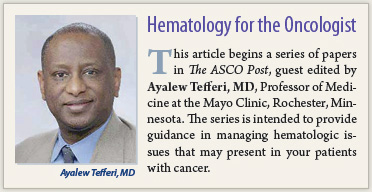
Following a priority review process for orphan diseases, ruxolitinb (Jakafi) recently became the first drug to receive FDA approval for the treatment of intermediate- and high-risk myelofibrosis. Discovery in 2004 of the JAK2V617F mutation in a significant proportion of patients with...
Integrative Oncology: Essential to Cancer Care
 During the 1960s and 1970s, the concept of an expanded approach to oncologic treatment encompassing “body, mind, and spirit” grew in patient popularity and morphed into two basic categories: “alternative” and “complementary” therapies. Together, these later became known by the acronym CAM, for...
During the 1960s and 1970s, the concept of an expanded approach to oncologic treatment encompassing “body, mind, and spirit” grew in patient popularity and morphed into two basic categories: “alternative” and “complementary” therapies. Together, these later became known by the acronym CAM, for...
Presurgical Gemcitabine/Cisplatin Improves Survival in Lung Cancer
Preoperative gemcitabine plus cisplatin had a statistically significant impact on outcomes among patients with stage IIB/IIIA non–small-cell lung cancer in a phase III randomized study comparing surgery alone or surgery plus preoperative chemotherapy. The 3-year progression-free survival rates were ...
CLEOPATRA Trial Finds Dual HER2 Blockade Improves Progression-free Survival in Advanced Breast Cancer
Women with HER2-positive advanced breast cancer are much less likely to have disease progression or die when two agents are used instead of one to target the HER2 signaling pathway, investigators for the international phase III CLEOPATRA trial found.
The 808 women studied were randomly assigned to ...
Highlights of Bladder Cancer Research Include Novel Agents and New Approach to Identifying Biomarkers
It is an exciting time for researchers involved in developing new therapies for bladder cancer. More agents are in clinical development, drugs with novel mechanisms and novel trial designs are being implemented, and functional collaboration is occurring in the field, according to Noah Hahn, MD,...
Advances in Lung Cancer Treatment Show Incremental Benefits, but Room for Improvement Remains
Newer therapies for the treatment of non–small cell lung cancer (NSCLC) and small cell lung cancer (SCLC) were discussed at the Chemotherapy Foundation Symposium. More inroads have been made in improving outcomes for patients with NSCLC than for those with SCLC, but there is still room for...
Update on Novel Treatments for Peripheral T-cell Lymphoma
At the recent Pan-Pacific Lymphoma Conference in Kauai, Hawaii, Julie M. Vose, MD, from the University of Nebraska Medical Center, Omaha, discussed novel treatments for peripheral T-cell lymphoma (PTCL).
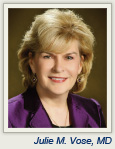 PTCL is a heterogeneous group of aggressive T-cell/natural killer (NK) cell non-Hodgkin...
PTCL is a heterogeneous group of aggressive T-cell/natural killer (NK) cell non-Hodgkin...
Gastric Cancer Is on the Rise: Screening and Education Are Vital

Gastric cancer is diagnosed in nearly 1 million people globally each year and is responsible for 740,000 deaths, making it the second leading cause of cancer death in the world. According to the American Cancer Society, more than 21,000 people in the United States were diagnosed with gastric...
New Indication for Cetuximab in Squamous Cell Carcinoma of the Head and Neck
In the Clinic provides overviews of novel oncology agents, addressing indications, mechanisms, administration recommendations, safety profiles, and other essential information needed for the appropriate clinical use of these drugs.
Cetuximab (Erbitux) was recently approved by the FDA for use in...
Michael C. Perry, MD, 1945–2011
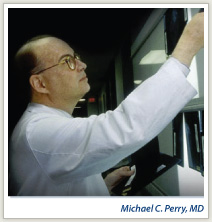 Michael C. Perry, MD, a renowned cancer clinician, educator, researcher, and administrator at the University of Missouri, Columbia, for more than 35 years, passed away October 23, 2011, after a long and courageous battle with polycystic kidney disease and cancer. He was 66.
Michael C. Perry, MD, a renowned cancer clinician, educator, researcher, and administrator at the University of Missouri, Columbia, for more than 35 years, passed away October 23, 2011, after a long and courageous battle with polycystic kidney disease and cancer. He was 66.
Dr. Perry served as...
Conquer Cancer Foundation Programs for Medical Students and Residents Support Diversity in Oncology Workforce

The Conquer Cancer Foundation funds two programs, the Medical Student Rotation (MSR) and the Resident Travel Award (RTA), to facilitate the recruitment and retention of individuals from populations underrepresented in medicine to cancer careers, with a special focus on the development of clinical ...
Weekly Online Polls Help Define Key Concerns of ASCO Members
![]()
ASCO members now have the opportunity to help the Society gather information and opinions about important cancer policy issues. ASCO in Action, ASCO’s revamped policy news website (http://ascoaction.asco.org), features weekly polls designed to gauge the views of ASCO members on a variety of...
Young Investigator Award Renamed to Honor ASCO Founder Jane C. Wright, MD
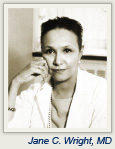 At the 2011 Annual Meeting, the Conquer Cancer Foundation renamed one of its annual awards to honor the legacy of one of ASCO’s groundbreaking founders. The Jane C. Wright, MD, Young Investigator Award (YIA) recognizes Dr. Wright’s leadership at ASCO, her contributions to the field of oncology, and ...
At the 2011 Annual Meeting, the Conquer Cancer Foundation renamed one of its annual awards to honor the legacy of one of ASCO’s groundbreaking founders. The Jane C. Wright, MD, Young Investigator Award (YIA) recognizes Dr. Wright’s leadership at ASCO, her contributions to the field of oncology, and ...
ASCO President Michael P. Link, MD, Joins Colleagues in Honoring a Friend and Touching the Future through Philanthropy
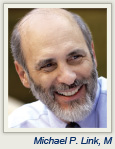
As an active member of ASCO, and as a leader of the Society in recent years, ASCO President Michael P. Link, MD, has a long history of giving to the Society-affiliated Conquer Cancer Foundation. “Our family has always felt that it’s a good thing to support,” he said. “The Foundation supports...
Help Your Patients Start Off Healthy in 2012
![]() The beginning of a new year is an opportunity for a fresh start for many, including people with cancer. To help your patients set and achieve their health and wellness goals, direct them to Cancer.Net (www.cancer.net), ASCO’s patient website, where they can learn about seven steps for a healthier...
The beginning of a new year is an opportunity for a fresh start for many, including people with cancer. To help your patients set and achieve their health and wellness goals, direct them to Cancer.Net (www.cancer.net), ASCO’s patient website, where they can learn about seven steps for a healthier...
Intensified Chemotherapy with R-ACVBP Improves Survival in Younger Patients with Diffuse B-cell Lymphoma
Compared with standard R-CHOP (rituximab [Rituxan], doxorubicin, cyclophosphamide, vincristine, and prednisone), intensified immunochemotherapy with R-ACVBP (dose-intensive rituximab, doxorubicin, cyclophosphamide, vindesine [not available in U.S.], bleomycin, and prednisone) significantly improves ...
Adjuvant Chemotherapy with S-1 Improves Survival in Stage II/III Gastric Cancer
Postoperative adjuvant therapy with the oral fluoropyrimidine derivative S-1 improved overall survival and relapse-free survival in patients with stage II or III gastric cancer who had D2 gastrectomy. Five-year survival rates in the phase III study were 71.7% for patients in the S-1 group vs 61.1%...
Physician-based Screening Leads to the Detection of Thinner Melanomas with More Favorable Prognosis
Physician-based screening leads to detection of thinner melanomas that were less likely to have negative prognostic attributes such as ulceration and dermal mitosis, according to a retrospective review of patient records and biopsy logs from 394 patients diagnosed with cutaneous melanoma. The...
The Newly Diagnosed Patient with Cancer and Access to Care
A study presented at the 2011 ASCO Annual Meeting raised concerns that newly diagnosed cancer patients are having trouble seeing an oncologist. Interviews with several cancer centers and community practices, however, suggest that the process runs smoothly, for the most part.
Majority of Patients...
MD Anderson Cancer Center’s New President Has a Bold Vision
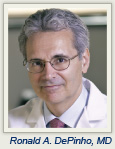 On September 1, 2011, Ronald A. DePinho, MD, became only the fourth President in the 70-year history of The University of Texas MD Anderson Cancer Center in Houston. Dr. DePinho spent the previous 14 years as head of Dana-Farber’s Belfer Institute for Applied Cancer Science. In a recent interview...
On September 1, 2011, Ronald A. DePinho, MD, became only the fourth President in the 70-year history of The University of Texas MD Anderson Cancer Center in Houston. Dr. DePinho spent the previous 14 years as head of Dana-Farber’s Belfer Institute for Applied Cancer Science. In a recent interview...
Benefits of Radiation after Breast-conserving Surgery Cut Risk of Recurrence in Half
In the News focuses on media reports that your patients may have questions about at their next visit. This continuing column will provide summaries of articles in the popular press that may prompt such questions, as well as comments from colleagues in the field.
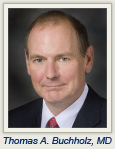 “After breast-conserving surgery,...
“After breast-conserving surgery,...
Humor Is Helping Me Survive Cancer
 Despite a strong family history of colon cancer—all five of my mother’s siblings had colon cancer, and my mother died of the disease 10 years ago—when some flecks of blood started showing up on my toilet tissue in early 2005, I figured it was from hemorrhoids. At 38, I was a marathon runner and in...
Despite a strong family history of colon cancer—all five of my mother’s siblings had colon cancer, and my mother died of the disease 10 years ago—when some flecks of blood started showing up on my toilet tissue in early 2005, I figured it was from hemorrhoids. At 38, I was a marathon runner and in...
